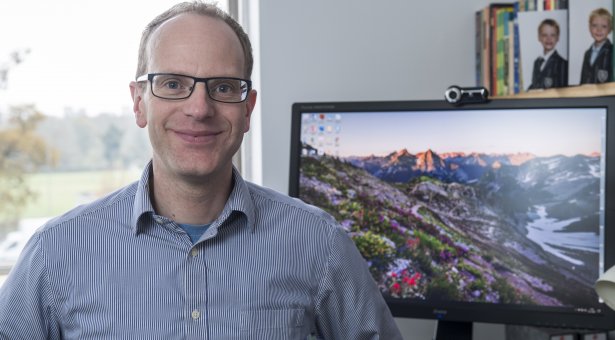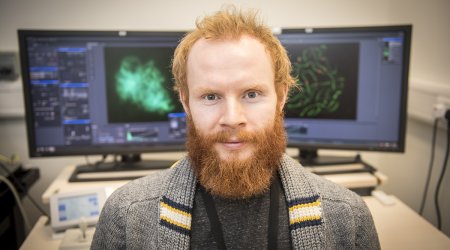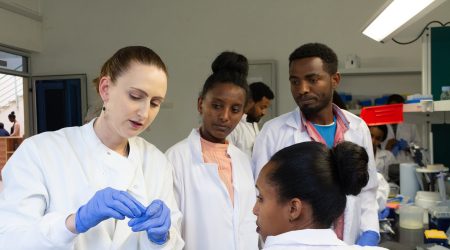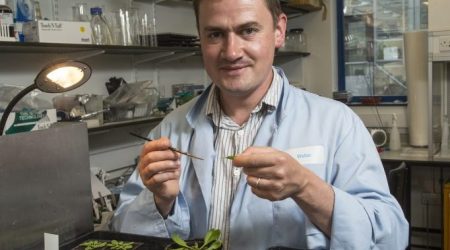Professor Martin Howard among the outstanding scientists elected to EMBO Membership

Professor Martin Howard has been elected as a member of the prestigious European Molecular Biology Organisation (EMBO).
Professor Howard, a group leader at the John Innes Centre, is among 100 New Members and 20 Associate Members joining the organisation as it celebrates its 60th anniversary year.
The Howard group combines predictive mathematical modelling with long-term experimental collaborations, to dissect biological mechanisms too complex to unravel by experiments alone.
The group is currently focusing on two principal areas: how cells remember past events, through epigenetic memory systems, and on how proteins can generate spatiotemporal patterns, with work in the latter area focusing on the dynamics of crossover site selection during meiosis.
Professor Howard said: “It is a great honour and privilege to be elected as a member of EMBO. I am happy to share this honour with the many talented researchers and collaborators who have contributed to the work of my group over the years. It is particularly pleasing that the heavily interdisciplinary work of my group, applying theoretical tools from physics and mathematics to basic biology, is being recognised.”
Director of the John Innes Centre Professor Graham Moore FRS said: “I am delighted that EMBO has honoured the work of Martin Howard in this way. The work of Martin’s group in uniting computational and experimental approaches is a shining example of the power of collaboration both within the John Innes Centre and internationally.”
Membership of EMBO recognises research excellence and outstanding achievements in the life sciences. John Innes Centre researchers who have been honoured by EMBO include Professor Anne Osbourn FRS in 2022 and Professor Saskia Hogenhout FRS in 2023.
The new EMBO Members and Associate Members have been recognized for accomplishments that cover the spectrum of life science research, including work that has advanced understanding of how infectious disease spreads, the intricacies of ocean nutrient cycles, the mysteries of cellular signaling networks, the secrets of how plants survive in desert environments, and the links between the biology of our brains and our emotions.
EMBO Director Fiona Watt said: “The new EMBO Members and Associate Members have made immense contributions to fundamental life science research, and, in many cases, their work has paved the way for innovations that have improved lives and livelihoods around the world. As EMBO marks its 60th anniversary, we celebrate the pivotal roles played by the EMBO Membership in strengthening international life science research and contributing to the EMBO Programmes and activities. I send my warmest congratulations to all those elected.”
To celebrate EMBO’s 60th anniversary, EMBO Council invited the EMBO Membership to elect 100 new EMBO Members and 20 EMBO Associate Members this year.
The newly elected Members and Associate Members reside in 37 countries/territories. The new EMBO Members are based in 24 Member States of the EMBC, the intergovernmental organization that funds the main EMBO Programmes and activities.
The 20 new Associate Members reside in 13 different countries/territories, including EMBO’s global cooperation partners.
The first EMBO Members were elected in 1964 – that initial group of 169 life scientists has now grown into a community of more than 2,100 EMBO Members and Associate Members. 92 Nobel laureates are among those previously elected to the EMBO Membership.
EMBO Members guide the execution of the EMBO Programmes and activities, for example by evaluating funding applications, serving on EMBO Council and committees, and contributing to initiatives such as training, policy, outreach and mentorship. New members are nominated and elected by the existing EMBO Membership.
EMBO will formally welcome the new members at a meeting of the EMBO community between 29 October and 1 November 2024 in Heidelberg, Germany. An online directory listing all EMBO Members and Associate Members, their affiliations, and subject areas is available here.



